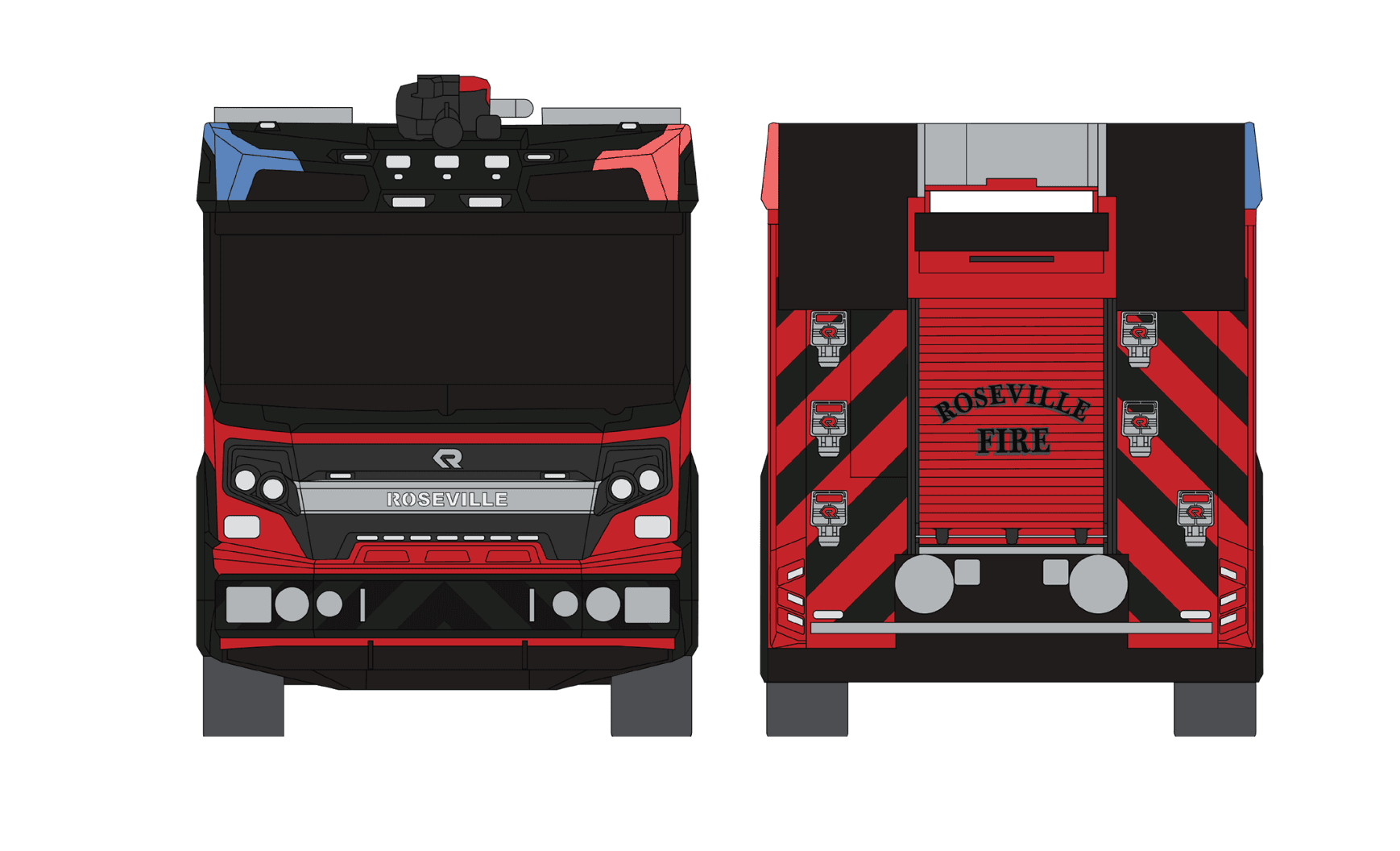The City of Roseville is purchasing a new state-of-the-art electric fire engine, which will reduce greenhouse emissions and deepen the city’s investment in sustainable technology.
The electric vehicle’s smaller, sleeker design means it can maneuver in tighter spaces, and a quieter, more ergonomic cab will reduce firefighter injuries.
The City Council approved the purchase of an electric fire engine earlier this year, making Roseville one of the first cities in the state to make the investment. Fire department leaders are working with the manufacturer Rosenbauer with plans to have the fire truck in service by 2025. Roseville currently has three diesel fire engines and replaces one every five years.
“Innovation has always been part of the City of Roseville’s culture,” said Roseville Fire Chief David Brosnahan. “In addition, The City Council and staff have also taken a very proactive approach to sustainability, so this investment in an electric fire engine is consistent with that environmental stewardship.”
 "Rosenbauer is excited to continue our strong partnership with the City of Roseville by bringing the revolutionary technology of the RTX to the city," said Todd McBride Rosenbauer RTX Sales & Marketing Manager.
"Rosenbauer is excited to continue our strong partnership with the City of Roseville by bringing the revolutionary technology of the RTX to the city," said Todd McBride Rosenbauer RTX Sales & Marketing Manager.
The new technology could also help the city’s bottom line.
“Diesel engines have dramatically grown in cost, so we wanted to evaluate other options,” Brosnahan said. “Electric engines cost more upfront, but year over year, I believe it will be less expensive.”
The electric engine will cost an estimated $1.8 million compared to $1.1 to $1.4 million for a diesel engine.
But the new vehicle will last an estimated 10 years as the department’s primary or “first out” truck and a total of 20 years as part of the city’s fleet. Diesel fire engines typically last five years as the “first out” truck with a 15-year life span.
The electric fire engine also comes with a longer five-year bumper-to-bumper warranty compared to a standard 1-year warranty on a traditional diesel apparatus, this will also help to reduce maintenance costs. In addition, the electric truck will save the city as much as $15,000 in diesel fuel annually.
In order to ensure operation at long emergency incidents, the new electric engine also includes an energy back-up unit. This is a small diesel engine and electric generator that is mounted on the top of the engine to provide electricity for incidents that exceed the battery capacity. This means that no matter the incident the fire department can still fully operate for as long as needed.
The city plans to pursue grants now available to help offset the initial costs.
The environmental benefits, including improved air quality at emergency scenes, will be immediate, Brosnahan said. That’s because fire engines must be left running while firefighters battle a blaze or respond to an incident. Sometimes those incidents can last hours.
“I have been out on calls where we had to bring out a diesel fuel truck to refuel fire engines while they are out on the scene,” Brosnahan said.
The electric truck will reduce those emissions.
Assistant Fire Chief Neil Sjostrom said improving working conditions is also another motivation. Cabs in older diesel fire engines are loud and hot, which can impact firefighters’ hearing and stress levels.
Older fire engines have a 24-inch step-up into the cab. That step, done thousands of times in a career with 80 pounds of gear strapped to firefighters’ backs, puts strain on knees and hips.
The electric fire truck has a 7-inch step-up and a much quieter cab, Sjostrom said.
“We believe we can reduce injuries and workers’ compensation costs. But it’s not just about careers.” Sjostrom said. “It’s our goal as an employer to be looking for ways to ensure employees have both a healthy career and a healthy retirement.”